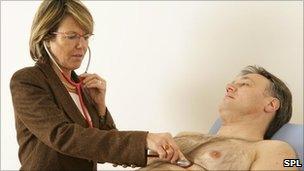High blood pressure patients 'benefit' from therapy
- Published

More people took their medication after one-to-one sessions
Patients with high blood pressure would benefit from a series of personal advice sessions on their medication, say UK researchers.
Writing in the Journal of Human Hypertension, they said many of the 10 million people with the condition in the UK fail to take their medication.
The study showed a 14% reduction in blood pressure when people took part in "adherence therapy".
The British Heart Foundation said the findings should not be ignored.
High blood pressure, known as hypertension, is one of the leading causes of heart disease and stroke.
It can be treated with medication, but the authors claim that half of patients do not take their medication correctly.
Extra support
Issues such as worries about side effects, a lack of motivation to take drugs and not following the correct instructions were identified.
The team at the University of East Anglia followed 136 patients in Jordan.
Half continued to take their medication normally while the other half attended 20-minute face-to-face sessions weekly for seven weeks, in which patients were given tailored advice.
The patients given adherence therapy took 97% of their medication, while those who continued normally took only 71%.
On average, systolic blood pressure dropped by nearly 14% from 164.5mm Hg to 141.4mm Hg.
'Major advance'
Professor Richard Gray at the School of Nursing and Midwifery at University of East Anglia, said: "Our findings suggest a clear clinical benefit in these patient-centred sessions.
"Tackling the widespread failure to take medication correctly would lead to a major reduction in stroke and heart disease. If adherence therapy were a new drug it would be hailed as a potentially major advance in hypertension treatment."
Amy Thompson, senior cardiac nurse at the British Heart Foundation, said: "We know people with high blood pressure are more likely to have a heart attack or stroke so these findings shouldn't be ignored.
"However, we need to explore further how patients may benefit from techniques such as one-on-one support. In the meantime, healthcare professionals need to consider the possible barriers which stop people taking their medication.
"If you're taking medicines it's vital you take them exactly as prescribed by your doctor. You could be putting your health, or even your life, at risk if you don't."
- Published13 January 2011
- Published17 November 2010